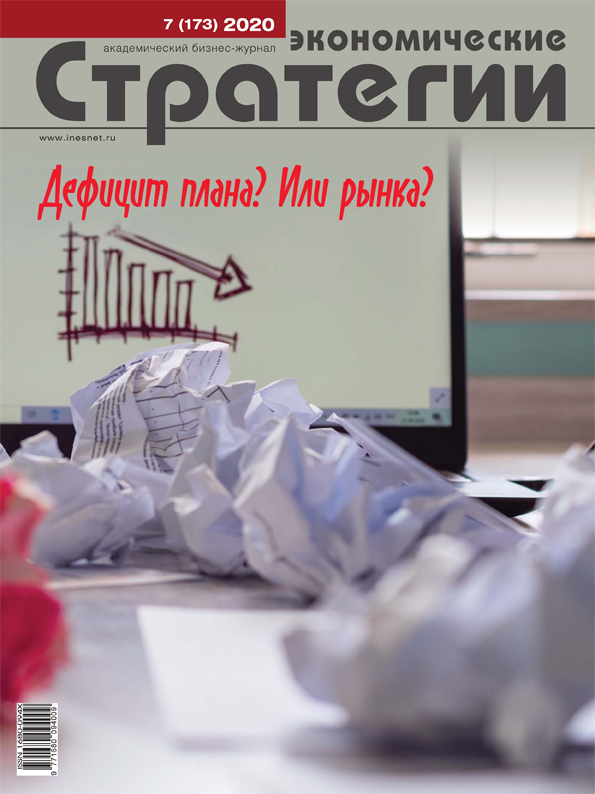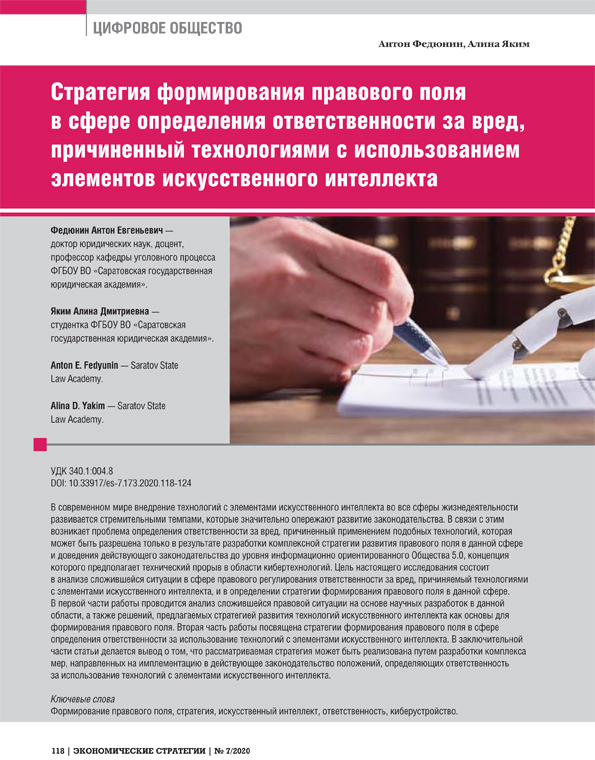Strategy of a Legal Framework Formation in the Field of Determining Liability for the Harm Caused by Technologies with the Use of Artificial Intelligence Elements
DOI: 10.33917/es-7.173.2020.118-124
In the modern world, introduction of technologies with the elements of artificial intelligence into all spheres of life is developing rapidly, significantly ahead of the development of legislation. In this regard, the problem of determining liability for the harm caused by the use of such technologies arises. The problem can be solved by creating a comprehensive strategy for the development of the legal field in this area and bringing the current legislation to the level of information-oriented Society 5.0, the concept of which assumes technical breakthrough in the field of cyber technologies. The aim of this research is to analyze current situation in the field of legal regulation of liability for the harm caused by technologies with the elements of artificial intelligence and to determine the strategy for the formation of legal framework in this field. In the first part of the article the analysis of the current legal situation on the basis of scientific developments in this area is carried out, as well as the solutions proposed by the strategy for the development of artificial intelligence technologies as the basis for the formation of the legal framework are shown. The second part of the article is devoted to the strategy of a legal framework formation in the field of determining responsibility for the use of technologies with the elements of artificial intelligence. In conclusion it is said that the strategy under consideration can be realized by developing a set of measures aimed at implementing the provisions that define responsibility for the use of technologies with elements of artificial intelligence into current legislation.
References:
1. Ukaz Prezidenta RF ot 10 oktyabrya 2019 g. N 490 “O razvitii iskusstvennogo intellekta v Rossiiskoi Federatsii” (vmeste s “Natsional’noi strategiei razvitiya iskusstvennogo intellekta na period do 2030 goda”) [Decree of the President of the Russian Federation of 10.10.2019 N 490 “On the Development of Artificial Intelligence in the Russian Federation” (Together with the “National Strategy for the Development of Artificial Intelligence for the Period up to 2030”)]. Sobranie zakonodatel’stva Rossiiskoi Federatsii, 2019, st. 5700.
2. Filipova I.A. Pravovoe regulirovanie iskusstvennogo intellekta [Legal Regulation of Artificial Intelligence]. Ucheb. posobie. N. Novgorod, Nizhegorodskii gosuniversitet, 2020, 90 p.
3. Larina E.S., Ovchinskii V.S. Iskusstvennyi intellekt. Etika i pravo. Sud’ya s iskusstvennym intellektom [Artificial Intelligence. Ethics and law. Artificial Intelligence Judge]. Moscow, Knizhnyi mir, 2019, p. 8. (“Kollektsiya Izborskogo kluba”.)
4. Alekseev S.S., Alekseeva O.G., Belyaev K.P., et al. Grazhdanskoe pravo [Civil Law]. Ucheb.: V 2 t. Moscow, Statut, 2018, vol. 1, p. 105.
5. Chegovadze L.A. Struktura i sostoyanie grazhdanskogo pravootnosheniya [The Structure and State of Civil Legal Relations]. Moscow, Statut, 2004, p. 115.
6. Arkhipov V.V., Naumov V.B. Iskusstvennyi intellect i avtonomnye ustroistva v kontekste prava: o razrabotke pervogo v Rossii zakona o robototekhnike [Artificial Intelligence and Autonomous Devices in the Context of Law: on the Development of the First Law on Robotics in Russia]. Trudy SPIIRAN, 2017, vyp. 55, pp. 46–62.
7. Ryzhenkov A.Ya. Deistvie svoei voleii v svoem interese kak printsip grazhdanskogo zakonodatel’stva [Action by One’s Own will and in One’s Own Interest as a Principle of Civil Legislation]. Yurist, 2014, no 16, pp. 17.
8. Balkin J.M. The Path of Robotics Law. California Law Review, 2015.Vol. 6. P. 51.
9. VolkovA.V. Svoboda voli v grazhdanskom prave [Freedom of will in Civil Law]. Yurist”-Pravoved”, 2010, no 5, available at: https://cyberleninka.ru/article/n/svoboda-voli-v-grazhdanskom-prave.
10. Begishev I.R., Latypova E.Yu., Kirpichnikov D.V. Iskusstvennyi intellect kak pravovaya kategoriya: doktrinal’nyi podkhod k razrabotke definitsii [Artificial Intelligence as a Legal Category: a Doctrinal Approach to the Development of a Definition]. Aktual’nye problem ekonomiki i prava, 2020, no 1, pp. 79–91.
11. Denisov N.L. Kontseptual’nye osnovy formirovaniya mezhdunarodnogo standarta pri ustanovlenii ugolovnoi otvetstvennosti za deyaniya, svyazannye s iskusstvennym intellektom [Conceptual Foundations for the Formation of an International Standard in Establishing Criminal Responsibility for Acts Related to Artificial Intelligence]. Mezhdunarodnoe ugolovnoe pravo i mezhdunarodnaya yustitsiya, 2019, no 4, pp. 18–20.
12. Kozaev N.Sh. Sostoyanie ugolovnoi politiki i voprosy preodoleniya krizisnykh yavlenii v ugolovnom prave [The State of Criminal Policy and Issues of Overcoming Crisis Phenomena in Criminal Law]. Yuridicheskii vestnik DGU, 2016, no 1, pp. 96–101.
13. Averinskaya S.A., Sevost’yanova A.A. Sozdanie iskusstvennogo intellekta s tsel’yu zlonamerennogo ispol’zovaniya v ugolovnom prave Rossiiskoi Federatsii [Creation of Artificial Intelligence for the Purpose of Malicious Use in the Criminal Law of the Russian Federation]. Zakon i pravo, 2019, no 2, pp. 94–96.
14. Kibal’nik A.G., Volosyuk P.V. Iskusstvennyi intellekt: voprosy ugolovno-pravovoi doktriny, ozhidayushchie otvetov [Artificial Intelligence: Questions of Criminal Law Doctrine, Awaiting Answers]. Vestnik Nizhegorodskoi akademii MVD Rossii, 2018, no 4, pp. 173–178.
15. Hallevy G. When Robots Kill: Artificial Intelligence under Criminal Law. University Press of New England, 2013, pp. 177–178.
16. Mosechkin I.N. Iskusstvennyi intellect i ugolovnaya otvetstvennost’: problem stanovleniya novogo vida sub”ekta prestupleniya [Artificial Intelligence and Criminal Responsibility: Problems of the Formation of a New Type of Subject of Crime]. Vestnik Sankt-Peterburgskogo universiteta. Pravo, 2019, no 3, pp. 461–476.
17. Khisamova Z.I., Begishev I.R. Ugolovnaya otvetstvennost’ i iskusstvennyi intellekt: teoreticheskie i prikladnye aspekty [Criminal Liability and Artificial Intelligence: Theoretical and Applied Aspects]. Vserossiiskii kriminologicheskii zhurnal, 2019, no 4, pp. 564–574.
18. Shestak V.A., Volevodz A.G., Alizade V.A. O vozmozhnosti doktrinal’nogo vospriyatiya sistemoi obshchego prava iskusstvennogo intellekta kak sub”ekta prestupleniya: na primere ugolovnogo zakonodatel’stva SShA [On the Possibility of Doctrinal Perception by the Common Law System of Artificial Intelligence as a Subject of a Crime: on the Example of the US Criminal Law]. Vserossiiskii kriminologicheskii zhurnal, 2019, no 4, pp. 547–554.
19. Petit N. Law and Regulation of Artificial Intelligence and Robots — Conceptual Framework and Normative Implications, available at: https://pdfs.semanticscholar.org/3f70/353ce297322a8029b95d8c734a7a6a95f749.pdf.
20. Ageev A.I. Upravlenie tsifrovym budushchim [Digital Future Management]. Mir novoi ekonomiki, 2018, no 3, pp. 6–23.



